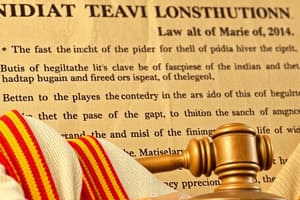Podcast
Questions and Answers
What is the time frame within which one can amend their pleadings as a matter of course?
What is the time frame within which one can amend their pleadings as a matter of course?
- 14 days after serving pleadings
- 21 days after serving pleadings (correct)
- 30 days after serving pleadings
- 7 days after serving pleadings
Under what condition can a new claim be added if the statute of limitations has expired?
Under what condition can a new claim be added if the statute of limitations has expired?
- If the new claim is unrelated to the original complaint
- If the claim relates back to the original complaint (correct)
- If the court permits an extension
- If both parties agree to the amendment
Which of the following is a requirement for parties to be joined as co-plaintiffs or co-defendants?
Which of the following is a requirement for parties to be joined as co-plaintiffs or co-defendants?
- They must share the same attorney
- They must be involved in the same transaction or occurrence (correct)
- They must have identical claims
- They must reside in the same location
What is required for a party to successfully submit a supplemental pleading?
What is required for a party to successfully submit a supplemental pleading?
What does a 'misnomer' refer to in the context of amending pleadings?
What does a 'misnomer' refer to in the context of amending pleadings?
In what scenario can a defendant add claims against existing parties without being compelled to?
In what scenario can a defendant add claims against existing parties without being compelled to?
What distinguishes a compulsory counterclaim from a permissible counterclaim?
What distinguishes a compulsory counterclaim from a permissible counterclaim?
What is a key consideration when determining if amending a pleading may prejudice a client?
What is a key consideration when determining if amending a pleading may prejudice a client?
Flashcards
Amending pleadings (before trial)
Amending pleadings (before trial)
A change to a complaint, answer, or other pleading, allowed before the trial begins. There's one free amendment as a matter of course, and amendments must be made within 21 days.
Relation Back (amendments)
Relation Back (amendments)
Allows adding a new claim even if the statute of limitations has run, if the claim arises from the same incident as the original one.
Supplemental pleadings
Supplemental pleadings
Allow adding claims or defenses for events that happened after the original pleading was filed.
Joinder of parties (Rule 20)
Joinder of parties (Rule 20)
Signup and view all the flashcards
Joinder of claims (Rule 18)
Joinder of claims (Rule 18)
Signup and view all the flashcards
Compulsory Counterclaim
Compulsory Counterclaim
Signup and view all the flashcards
Permissive Counterclaim
Permissive Counterclaim
Signup and view all the flashcards
Counterclaim
Counterclaim
Signup and view all the flashcards
Study Notes
Amending Pleadings
- Before Trial:
- One free amendment allowed within 21 days of serving pleadings.
- 21 days after receiving responsive pleadings (like an answer)
- Court permission or opposing party consent (often for professional reasons or to avoid scheduling conflicts).
- Amendment should not prejudice the other party.
- During/After Trial:
- Amendments allowed when justice requires.
- Relation Back (Rule 15(c)): Allows amendment that would be barred otherwise by statute of limitations, if:
- The new claim arises from the same conduct, transaction, or occurrence as the original.
- The amended party knew or should have known the action was meant for them, even if the plaintiff mistakenly named the wrong party (misnomer).
- Supplemental Pleadings: Used for claims arising after pleading is filed
Joinder & Supplemental Jurisdiction
- Joinder of Claims and Parties: Rules for consolidating legal actions for efficiency but consider SMJ/PJ. Crucial to understand Supplemental Jurisdiction.
- Parties: Can join claims/parties (Rule 20) in similar transactions/occurrences or if there's a common question of law/fact.
- Claims: Plaintiff can join as many claims against a Defendant (even unrelated) (Rule 18).
- Defendant's Claims:
- Compulsory Counterclaims: Related to the same transaction/occurrence must be raised in the action.
- Permissive Counterclaims: Unrelated claims can be raised but are not required.
- Crossclaims: Similar to counterclaims but for claims against co-parties. Typically regarding the same property.
- Severance: (Rule 21) Allows court to divide claims/add/remove parties, into separate lawsuits if appropriate
- Supplemental Jurisdiction (Section 1367): Key case is the United Mine Workers case involving the consolidation of lawsuits with different subjects that were related in other ways.
Studying That Suits You
Use AI to generate personalized quizzes and flashcards to suit your learning preferences.




